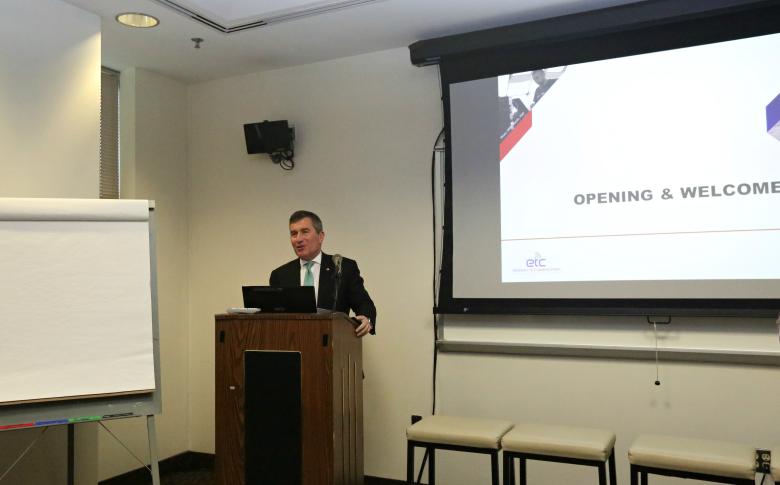Assistant Secretary of State for Economic & Business Affairs, Charles Rivkin, Opens Inaugural ETC Connect Day

"Ultimately, access to communications is fundamental to improving lives and dignity, livelihoods and economies."
The message of the importance of communications in humanitarian emergency repsonse was delivered loud and clear today at the inaugural ETC Connect Day held in Washington D.C. in partnership with the US Department of State. The event brought together humanitarian, private sector and government organisations to tackle and explore the ETC strategy which seeks to ensure that by 2020, all those responding to emergencies - including affected communities - have access to vital communications services.
Assistant Secretary, Bureau of Economic and Business Affairs, US Department of State, Charles H. Rivkin, gave the opening address, imparting the importance of communications as aid, and the need for strong partnerships, collaboration and alliances to reach shared life-saving objectives. "With a two-way flow of communication, we can direct communities to services and resources they need, and we can assess their individual needs," he said. "Just as importantly, they can use their communications capability to call attention to what help is needed for them and their community. They can organize as communities and become their own responders. They can restore their livelihoods and, most importantly, their dignity."
Excerpts of Remarks:
Charles H. Rivkin
Assistant Secretary, Bureau of Economic and Business Affairs
Washington, DC
May 4, 2016
We are especially proud to cosponsor this day because increasing access to communications worldwide is a priority for the U.S. government. As more and more disasters occur around the world, that access has become even more critical. It enables people to communicate. It allows our responses to become more targeted, more efficient and more effective. Ultimately, access to communications is fundamental to improving lives and dignity, livelihoods and economies.
With a two-way flow of communication, we can direct communities to services and resources they need, and we can assess their individual needs.
Just as importantly, they can use their communications capability to call attention to what help is needed for them and their community.
They can organize as communities and become their own responders. They can restore their livelihoods and, most importantly, their dignity.
That is why we are proud to stand in support of ETC’s “ETC2020” strategy, which is working to strengthen local communities as first-responders, and enable innovative and more effective humanitarian assistance over the next five years.
Today you will have the opportunity to share ideas and best practices about how we can better realize a coordinated and effective ICT response. And our office of International Communications and Information Policy looks forward to continuing our close coordination with the ETC.
I’d like to leave you with the words of an old industrialist – Henry Ford. While his business was automobiles, he knew a thing or two about the importance of team work.
He said: “Coming together is the beginning. Keeping together is progress. Working together is success.”
I believe we are well on our way to accomplishing all three, as we work to build robust networks to respond to disasters and conflicts all over the world.
To our ETC colleagues, let me say: Thank you for the work you do every day to bring lifesaving communications to communities in need around the world.
Thank you, also, to our industry, humanitarian, government and civil society colleagues here today. Your willingness to roll up your sleeves to partner with and support the ETC mission and its 2020 strategy will not only change lives, it will save them.
For the full remarks, see: US Department of State, Remarks at the Emergency Telecommunications Cluster "Connect Day"